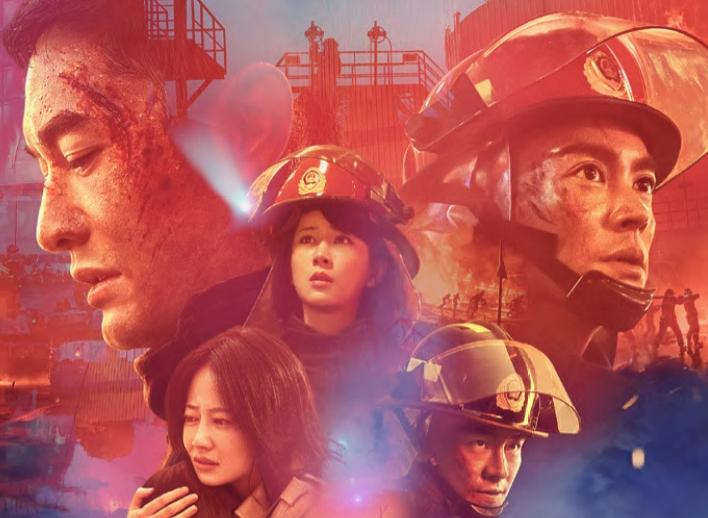Fires, volcanic eruptions, deadly earthquakes and political turmoil encompass but a fraction of the global upheaval that has since carried into the new year. Thus, Tony Chan’s visually breathtaking thriller, The Bravest, couldn’t have come at a more introspective and opportune time for Chinese cinema as the industry mapped out a specific course in the last few years, segueing from military-themed vehicles to more rescue-centric narratives as seen in films like The Captain with Hanyu Zhang, and Dante Lam’s aptly-named The Rescue.
At the crux of Chan’s heroic actioner, featuring the talents of Huang Xiaoming are some of the usual themes that are inherent to a film about a team of trained professionals chisled and engrained to face danger head-on, including paying homage to the lives of those who ply their trade in real life, as well as those who make the ultimate sacrifice in the process. More to the point, however, Chan tackles several key relationships and the complexities there in, in order to foment the film’s stakes with almost each moment of increasing intensity.
Taking inspiration from “Tears are the Deepest Waters”, Mongolian reporter Baoerji Yuanye’s headline-making coverage ot the Dailan oil spill in 2010, such moments preamble the bleak fallout when tragedy strikes Special Brigade Captain Jiang Liang’d (Huang Xiaoming) unit. Demoted to serving a lower squadron at Dongshan, his best friend, Ma Weiguo (Du Jiang) is immediately promoted in his place at Special Brigade. To make matters worse, not only does Jiang’s psychological evaluation and PTSD diagnosis have his superiors convinced of his time to retire, but the incident soon begins to affect his family – in particular, his son, Miao (Lv Yuncong).
On the same day, a fire breaks out at an oil refinery at the Bingang Oil Depot that puts the city in danger, and thousands of firemen, Special Brigade and Dongshan included, are summoned to contain and extinguish the disaster. The fire itself is only a portion of the larger catastrophe that awaits if they aren’t vigilant, as the fire does more than threaten to combust an entire oil tower. The spillage has already set its sights on neighboring chemical towers which, if left unprotected, could trigger an even deadlier explosion and chemical fallout that could take the lives of eight million people within the blast radius.
The firemen are further hampered by a number of on-site conditions, from ocean trash clogging the pumps needed to fill hoses and hit the flames, to constant handwringing with corporare bureaucrats undermining their effort to protect their own bottom line. Worse comes to worse just as Miao and Jiang’s wife, Fang (Tan Zhuo), are swept into their own fight for survival amidst a city crippled by viral fear, panic and haphazard desperation, and with each passing minute as the flames worsen, it’s up to Jiang and Ma, and their teams, to assure that every on-the-ground decision and action counts in order to avoid the worst.
In the midst of it all is the recurring look into the lives of Jiang and Ma, and a friendship that underscores what almost always feels like a playful rivalry, joined otherwise by the stoic nature of their profession, and the undermining complexities of their own personal lives. The lives of brigade members Xu Xiaobin and Wang Lu, portrayed by actor Ou Hao and actress Yang Zi, respectively, are also explored as the two find themselves at a romantic impasse just before duty calls at the refinery. Squad member Zheng Zhi, played by Zhang Zhehan, finds himself disciplined by Captain Ma and kept on his toes accordingly as he awaits to be discharged in only a few months.
Some of these developments play slightly heavier than others, while aiding in the film’s transition between drama and action, and when the action takes off, it flies in all directions, firing on all cylinders. High speed lenses, exquisite visual effects and sound design capture fire sequences in all their nightmaring glory, as are the heavily-suited actors swept into the firefight, and the inescapable, gut-wrenching deaths of important characters as they’re consumed by the gargantuan conflagration.
Explosions are treated ten fold with flames engulfing every inch of the screen at times, enhancing the danger at every turn in ways that would even make Michael Bay perk up with appeal. At least one explosion sends a shockwave into neighboring streets, with windows bursting from inside apartment blocks and leaving the streets in total devastation, and it’s enough to signal viewers to pay attention as the increasing threat grows from the inferno at the refinery where much of the real fight is ado.
With the requisite laudation and ceremonial tribute that The Bravest invokes in its jingoistic praise for China’s heroic firefighting men and women, Chan’s script further extols the importance of cherishing life, putting pride aside, facing your inner-most fears, and making every moment count with the ones you love. It’s a bittersweet symphony that recapitulates its messaging with explosive fortitude, bookending two hours of emotive drama, and compelling, high-octane action that sweeps audiences ablaze.

